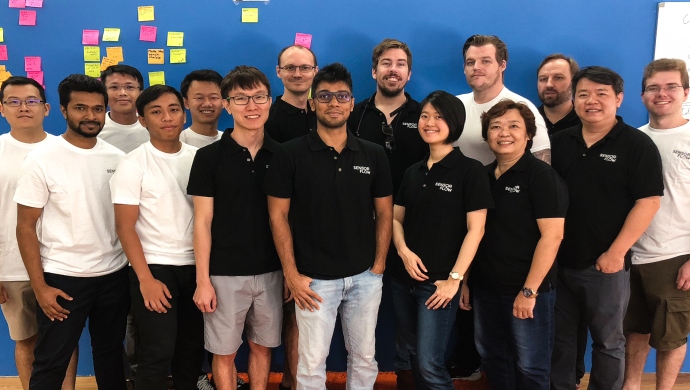Analysts believe that the Government’s plan to cut the number of foreign workers in the services sectors will affect businesses resulting in slower growth.
In Finance Minister Heng Swee Keat’s announcement of this year’s budget, he discussed the plan to reduce the ratio of foreign workers to the total workforce in the services sector by five points to 35% by the year 2021.
The purpose of the reduction is to encourage businesses to employ new technologies and reduce the reliance on foreign workers.
Workers from overseas have increased by 50,000 in the last five years, bringing the total number to 1.37 million in 2018.
However, these plans may prove to be a challenge for many firms, because losing low-cost labour will cause a heavier financial burden on them.
The Nikkei Asian Review quotes an economist at Oversea-Chinese Banking Corp (OCBC), Howie Lee, as saying, “In a period of low inflation, most businesses are struggling to raise prices. At the same time, the economic gloom this year will provide challenging headwinds to these sectors as consumers tighten their purse strings. Affected businesses will have to tread very carefully in their shifts from labor dependency to investing in capital under such an environment.”
Food and beverage businesses, in particular, may be among the hardest hit by this new policy.
Teo Siong Seng, the Chairman of the Singapore Business Federation (SBF) said that shifting and long hours in the food and business and retail sectors “often make it challenging for establishments to hire local workers, resulting in them having to rely on foreign workers,” ChannelNewsAsia reported.
He added, “We hope companies that are most affected by the lowering can take the opportunity to examine closely how they can leverage technology to innovate and restructure or redesign the jobs to make them more meaningful and attractive for local workers.”
Moreover, due to a global slowdown in the tech sector, as well as ongoing trade tensions between the United States and China, the two largest economies in the world, Singapore’s Ministry of Trade and Industry said lately that economic growth for 2019 will most likely falter from the 3.2 percent posted in 2018.
Heng said in his speech on Monday, “Relying on more and more foreign workers is not the long-term solution. What we need is to have a sustainable inflow of foreign workers to complement our workforce, while we upgrade our Singaporean workers and build deep enterprise capabilities in these sectors.”
This thrust is aligned with the country’s initiatives for Singapore to change into a knowledge-driven economy, while it moves further away from reliance on technology manufacturing and services.
One major concern with this thrust, however, is its effect of higher salaries, and therefore, operating costs.
According to Citigroup’s economists, “The implied reduction in labor supply in the services sector could maintain upward pressure on services wage growth…This measure is likely to contribute to an upstream cost factor in the medium term.”
However, Heng has already said that pressure from rising costs to businesses has already been taken into consideration.
He emphasized that the reduction of foreign workers is needed. “If we do not take action early, our firms will find it harder to compete in the years ahead, and our workers will be left behind.”
The Government will aid firms in making their transition to meet the new quotas by 2021.
Indranee Rajah, the Second Minister for Finance and Education, acknowledged that this will be a challenge for businesses, especially in the food and beverage sector, but is willing to help firms evaluate their operations in order to make them more manpower-efficient.
On her part, Manpower Minister Josephine Teo mentioned the Lean Enterprise Development (LED) scheme put in place specifically to help companies for this purpose, as it would assist in making them more manpower-lean and also upgrade the quality of jobs.
Read related: Govt chooses potential election year to cut foreign worker quota to 35%
https://theindependent.sg.sg/govt-chooses-potential-election-year-to-cut-foreign-worker-quota-to-35/

































